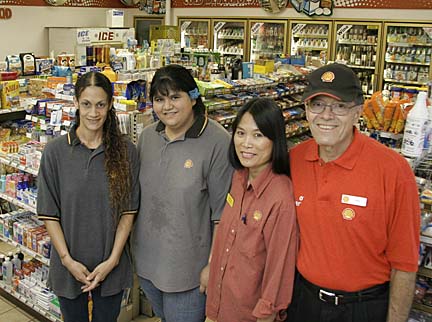
|
 Honolulu Lite. Extra.
|

|
Gas cap law is
filling up with
premium-grade frustration
I was getting a vicious case of deja vu while waxing this particular car at the Kaneohe Shell station, a kind of psychic wormhole that transported me back to Steven's Super Service in Aiea, where the boss made us wax police cars on Friday nights. I was in high school, and the boss liked to have a cop car parked out front. So various officers would leave their Plymouth Dusters with blue lights on top, and we'd wash and wax them, when we weren't pumping gas and cleaning up the station. I remember those days with a kind of nostalgic loathing.With gasoline prices bouncing around like lottery balls thanks to the ill-conceived "gas cap," I figured it would be a good time to return to my gas-station roots and see what was happening firsthand. What was happening was that I was remembering how much I hated waxing other people's cars.
I showed up at Bob Sawinski's Shell station and minimart at 6:30 a.m., much as I had shown up at Steven's on all those mornings before school -- tired and grumpy.
Kaneohe Shell is under contract with Shell to stay open 24 hours a day, 365 days a year. It's run by Bob and his wife, Louisa, with their two offspring, 10-year-old Robert Jr. and Celeste, 18, who is pursuing a degree in civil engineering at the University of Hawaii.
Louisa had been working since 3 a.m. When I showed up she was making bacon-and-egg sandwiches for early customers, as well as breakfast for Robert Jr. She wouldn't get off until after 7 that evening.
Celeste amazingly came in about 8 for some juice and money for lunch on her way to class. Amazing, because she had worked from 11 p.m. the night before to 3 in the morning.
I was beginning to realize that to run a family-owned small business in Hawaii, you can't be fond of sleeping. Or vacations. In 16 years, Bob and Louisa have been on vacation just once.
"In 1989, Shell shut us down for three weeks to change out the pumps," says Bob.
"I'm used to it now," says Celeste wistfully. "When I was young, I was always at home by myself or here working. The other kids got a better deal."
It had been a quiet night. The only thing that happened was that someone stole a $15 dustpan.
"I know who it is," Louisa says. "I know his family."
Plus, he was caught in the act on one of the many security cameras that cover every inch of the station.
With total camera coverage, security isn't much of an issue anymore. But there was the time years ago when a robber pulled a knife on Louisa and held it to her stomach. She had a can of pepper spray behind her back, but he was too close to use it.
"I told him I had called the police. And I prayed," she said. She hadn't called the police, but he fell for the bluff and fled. Ah, the glamour of small business.
An elderly woman is having trouble pumping gas, so I go out to help. Pumping gas was one of the things we did for customers in the old days. Now customers are on their own.
"You sure you want to do this?" I asked her, looking at that day's gas prices: $3.64 a gallon for regular and $3.84 for premium.
I helped her fill her tank and then kept her from driving off without her gas cap.
It's the other kind of gas cap, however, that's wreaking havoc at this station and others. The new law that was supposed to keep Hawaii prices low had the opposite effect, driving them to historic highs. And because they change each week based on a mainland average, station owners like Bob can't figure out how much to order. This week, it cost him 50 cents more per gallon to fill his three tanks with 21,000 gallons of fuel. But because customers know the wholesale price will drop next week, they aren't filling up this morning. But Bob can't drop the price next week until he's sold all of his more expensive gas.
"I can't throw 50 cents a gallon out the window," he says.
And because fewer people are buying gas, fewer people are buying stuff in the minimart. Louisa doesn't know how many sandwiches to make, how much beer to lay in or loaves of bread to put on the shelf.
I suggest a "Take Your Legislator to Work Day" so that lawmakers could see the unintended consequences of their more asinine actions.
"Some of them have never worked a day in their lives," Bob says of the legislators as he begins another glamorous aspect of his business, digging through the garbage to extract recyclable bottles and cans.
I have a happy vision of House Speaker Calvin Say or Senate President Robert Bunda up to their armpits in a trash bin at 8:30 a.m. as 61-year-old Bob Sawinski was just then.
I wondered if Say and Bunda could figure out how much gas to order, knowing that cars were lined up on Kamehameha Highway to get in last week -- and yet, on this morning, it was like a ghost town. Do they or their fellow lawmakers realize that after Bob pays for his gas, as well as the federal gas tax, the Hawaii wholesale tax, the Hawaii environmental tax, the Oahu County tax, as well as upkeep on the pumps and grounds, that he is making about 2 cents a gallon?
One of Bob's employees, Rachelle Wilhelm, shows up about then to take over the cash register so Louisa can take Robert Jr. to school. After sorting the rubbish, Bob sets to work washing a car. I help with waxing, but not much. He's got it down to a science, and I'm getting nasty flashbacks. Bob's workday will run a mere 12 hours. Celeste will be back at work after classes later that night. Louisa will wake up at 2 a.m. for another 16-hour shift.
Frankly, I'm embarrassed to see one family work so hard. I'm embarrassed that state officials would so cavalierly make their lives that much harder. And after spending some time with Bob and Louisa, my days as a gas station attendant don't seem so bad.
E-mail to City Desk
[News] [Business] [Features] [Sports] [Editorial] [Do It Electric!]
[Classified Ads] [Search] [Subscribe] [Info] [Letter to Editor]
[Feedback]
